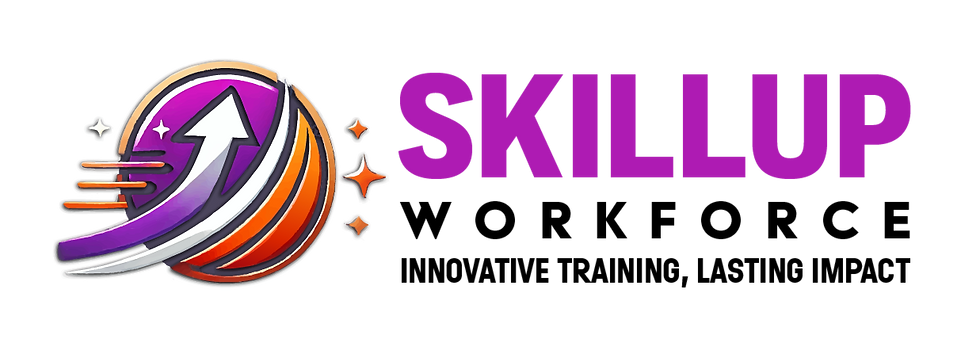Transferable Skills You Didn’t Know Employers Are Looking For (And How to Frame Yours)
- SkillUp Workforce, LLC
- Aug 19
- 3 min read

When most people think about what employers want, they immediately jump to hard skills: certifications, tech programs, industry-specific experience. But here’s something many job seekers overlook—the most valuable skills often aren’t on a certification list.
At SkillUp Workforce, LLC, we work with professionals transitioning across industries, returning to the workforce, or simply trying to grow within their current roles. And what we know for sure is this: employers are actively looking for transferable skills that keep teams moving forward.
If you’ve ever wondered how to stand out—even without the “perfect” background—this guide is for you.
What Are Transferable Skills?
Transferable skills are the portable abilities that move with you from one role, industry, or experience to another. These include everything from problem-solving and adaptability to time management and communication.
While common transferable skills like teamwork and leadership often get attention, some of the most in-demand ones fly under the radar.
Let’s explore the ones you might not realize you already have.
Underrated Transferable Skills Employers Love
1. Time Management
Employers value people who can meet deadlines, prioritize, and stay organized—especially in fast-paced environments.
Frame it like this:“Effectively managed competing priorities and tight timelines to complete all deliverables 2–3 days ahead of schedule.”
2. Multitasking Under Pressure
Especially relevant in roles like customer service, hospitality, retail, and admin support.
Frame it like this:“Handled 50+ customer inquiries daily while managing on-site logistics and team support, maintaining accuracy and client satisfaction.”
3. Decision-Making and Judgment
From frontline employees to team leads, employers want people who can think critically and make sound calls.
Frame it like this:“Made quick, informed decisions to resolve client issues on the spot, improving first-contact resolution rates by 30%.”
4. Learning Agility
Being able to learn new systems, tools, or workflows quickly is a huge asset—especially in changing industries.
Frame it like this:“Quickly onboarded to three new platforms in under two weeks, contributing to full productivity ahead of schedule.”
5. Resourcefulness
Employers want people who can figure things out—even when the path isn’t clear.
Frame it like this:“Improvised solutions and streamlined processes during staffing shortages, maintaining service quality with limited resources.”
Real-World Industry Transitions Using These Skills
Wondering if your experience can transfer to something new? Here are just a few cross-industry examples:
Hospitality → Healthcare
Hospitality skills: Guest service, multitasking, emotional intelligence
Transfer to healthcare: Patient relations, scheduling, front desk, team collaboration
How to frame it:“Provided compassionate service and managed multiple client needs under pressure—skills that directly support patient-centered care environments.”
Administrative Assistant → Tech Support
Admin skills: Organization, documentation, communication, software familiarity
Transfer to tech: Ticketing systems, help desk, data tracking, remote support
How to frame it:“Maintained internal systems, responded to requests with clarity, and documented workflows—foundation for technical support roles.”
Retail → Project Coordination
Retail skills: Customer service, time management, upselling, conflict resolution
Transfer to project work: Task delegation, communication, deadline tracking
How to frame it:“Managed daily operations and solved real-time customer issues—translating easily into team support and project communication.”
Tips for LinkedIn and Cover Letters
To maximize the impact of your transferable skills, it’s not just about having them—it’s about how you talk about them.
On LinkedIn
Update your headline to include your strengths, not just your title:“Team-Focused Professional | Known for Organization, Time Management & Service Excellence”
Use your ‘About’ section to explain your skills in action:“After several years in hospitality, I’ve developed strengths in multitasking, emotional intelligence, and client communication—all of which I now bring to roles in patient support and operations.”
In Your Cover Letter
Start with confidence:“Although my background is in retail, my ability to manage people, solve problems, and communicate under pressure directly supports success in administrative roles.”
Add a brief skills snapshot:“I bring transferable strengths in time management, client service, adaptability, and decision-making.”
At SkillUp Workforce, LLC, we help professionals:
Identify overlooked transferable skills and reframe them for new roles
Rewrite resumes and LinkedIn profiles that highlight real-world experience
Build language that aligns with employer expectations
Grow confidence in interviews and career storytelling
You don’t need to “start over”—you just need to translate what you already do well.
Your experience may not fit every job description perfectly—and that’s okay. What matters is your ability to recognize your core strengths, reframe them for your next step, and communicate them clearly.
Transferable skills aren’t fluff—they’re your foundation.
Ready to spotlight your strengths in a way that speaks to employers?
Let SkillUp Workforce help you frame your experience, tell your story, and move your career forward.




Comments